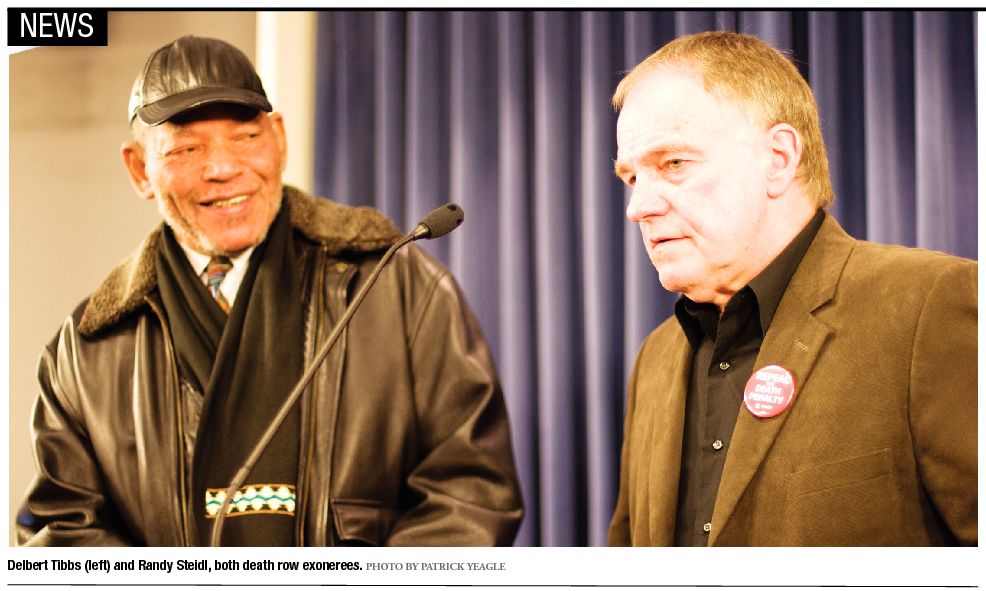
Death penalty fight not over
Capital punishment proponents call for public referendum
POLITICS | Patrick Yeagle
Though a bill to end the death penalty in Illinois awaits only the governor’s signature, proponents of capital punishment are calling instead for a public referendum on repeal.
Saying the death penalty repeal bill was “rushed through” the General Assembly, state Sen. Kirk Dillard of Hinsdale and state Rep. Dennis Reboletti of Elmhurst, both Republicans, announced legislation on Feb. 15 to put capital punishment in Illinois to a public vote, urging Gov. Pat Quinn to veto the repeal bill passed Jan. 11.
“The public has had very little, if any, input into the process, which was rushed through at the 11th hour of the veto session back in January,” Reboletti says. “It is my hope that the people will have their voice heard, and this referendum will be on the next general election ballot in 2012. Gov. Quinn has always been an advocate of letting the peoples’ voice be heard through referendums throughout his four decades of service to this state, and we’re hopeful he would be supportive of this measure.” Quinn has not indicated whether he will sign the bill, though he has said he is in favor of the death penalty. Reboletti, a former prosecutor in Will County for eight years, and Dillard, a member of the Illinois Capital Punishment Reform Study Committee, said they would support keeping in place Illinois’ moratorium on executions put in place by former Governor George Ryan in 2000.
The two legislators are also pushing legislation to reform the death penalty. Reboletti has introduced House Bill 1519, which would reduce the number of crimes that make a criminal case eligible for the death penalty, while Dillard’s Senate Bill 2277 would establish a panel to approve cases in which the death penalty is sought. The language of SB2276 is still being drafted, but Dillard said the panel would include the Cook County state’s attorney, a downstate state’s attorney, one state’s attorney apointed by the governor, a judge and a representative of the attorney general’s office. Dillard said he would not be opposed to having a civilian serve on the panel as well.
“That’s why we have hearings,” Dillard says.
“That’s why we don’t do things in an hour.”
Dillard’s bill is an attempt to mitigate racial and geographic inequalities that have surfaced in Illinois’ administration of the death penalty. Defendants in murder cases outside of Cook County are more likely to receive a death sentence than those outside Cook County, according to the Illinois Capital Punishment Reform Study Committee, while the research instigated by the Governor’s Commission on Capital Punishment in 2002 showed the death penalty was disproportionately applied to cases involving white victims.
Asked why more reforms weren’t implemented in the decade following Ryan’s moratorium, Reboletti noted that he had introduced reform legislation in several previous General Assembly sessions.
“The General Assembly doesn’t usually act until they are pushed into a corner,” Reboletti says.
The Illinois Coalition to Abolish the Death
Penalty worked to push the repeal bill through the legislature, overcoming an early defeat in the House to see it resurrected and passed by both chambers during the previous General Assembly session, which ended in January. Randy Steidl, a former death row inmate who was exonerated and released in May 2004 after 17 years in prison, appealed to Gov. Quinn on Feb. 14 to sign the repeal bill and commute remaining death sentences to life imprisonment without parole. Steidl’s story was first featured in Illinois Times in 1993.
“There’s always going to be wrongful convictions,” Steidl says. “On death row, you have a procedural clock, and you have certain procedures and hurdles you have to go through in order to prove your innocence. If you can’t meet that burden, that clock stops, and you’re executed. At least with life without parole, you don’t risk the possibility of executing an innocent person.”
Exoneree Delbert Tibbs, a Chicago resident who was wrongly convicted of a 1974 murder and rape in Florida, says he and Steidl are pushing for the abolition of capital punishment nationwide.
“It’s an issue of national concern,” Tibbs says. “Of the modern, industrialized – I’ll add – Christian countries …we’re the only nation that does that. In that regard, we are a throwback to the 19th century. We’ve got cell phones, but we’re still going to lock people up, put them in electric chairs and poison them.”
Contact Patrick Yeagle at [email protected].